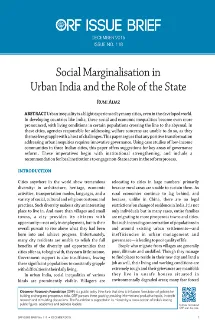Urban inequality is a blight experienced by many cities, even in the developed world.
In developing countries like India, these social and economic inequalities become even more
pronounced, with living conditions in certain populations crossing the line to the abysmal. In
these cities, agencies responsible for addressing welfare concerns are unable to do so, as they
themselves grapple with a host of challenges. This paper argues that any positive transformation
addressing urban inequities requires innovative governance. Using case studies of low-income
communities in three Indian cities, this paper offers suggestions for key areas of governance
reform. These imperatives begin with institutional strengthening, and include a
recommendation for local institutions to engage non-State actors in the reform process.

 PDF Download
PDF Download



 PREV
PREV


